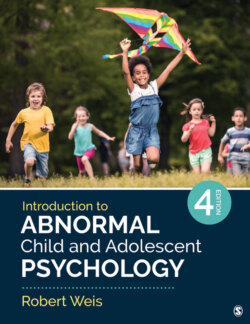Читать книгу Introduction to Abnormal Child and Adolescent Psychology - Robert Weis - Страница 58
На сайте Литреса книга снята с продажи.
Students as Evidence-Based Helpers
ОглавлениеCollege students often find themselves providing services to children and families in need. Students work as aides for people with developmental disabilities; behavior therapists for youths with autism; tutors for children with learning disabilities; or psychological technicians in residential treatment facilities, juvenile detention centers, and hospitals. Students also provide paraprofessional services through volunteer experiences. For example, many students mentor at-risk youths, provide in-services to grade school and high school students, monitor telephone crisis hotlines, and help local community mental health centers.
Do you provide frontline services like these? If so, you can greatly help children, adolescents, and families in need. Although you may not be in a position to direct interventions, you can approach treatment from the perspective of psychological science. Here are three groups of questions to ask yourself as you help others:
What is the evidence for the intervention or service that I am providing? Is there a scientific basis for my work? Are there alternative services that might provide greater benefits to the people I serve?
Am I effective? Am I monitoring the effectiveness of the services I provide to determine whether I am helping my clients? Is there any possibility that I might be harming them?
During my work, do I respect the rights and dignity of others, conduct myself in a responsible and professional manner, and represent the field of psychology with integrity? Are my activities being supervised by someone who practices in an ethically and scientifically mindful manner?
As you read this book, consider how you might use scientific principles to inform your understanding of child and adolescent disorders. A scientific approach to helping is not reserved for mental health professionals. All people who work with youths are called upon to use scientific evidence to help improve the functioning of others.
Review
Treatment often involves coordinated services from psychologists, physicians, teachers, and other professionals.
Students can also use the principles of evidence-based practice when they volunteer to help children and families in need.
